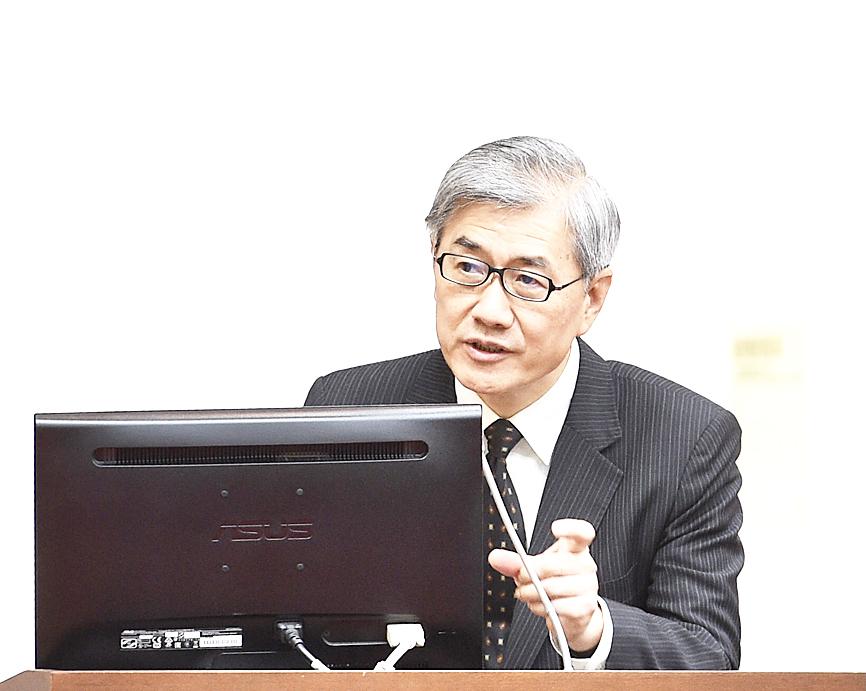The Financial Supervisory Commission (FSC) is conducting a financial examination of Next Bank (將來銀行), a Web-only bank that has not yet begun operations, to see if it acquired an overpriced information technology (IT) system from its largest shareholder, Chunghwa Telecom Co (中華電信), the commission said yesterday.
The commission last week received reports about the deal from a few whistle-blowers, as well as Chinese Nationalist Party (KMT) Legislator Alex Fai (費鴻泰).
It is rare for the commission to inspect banks that have not yet begun operations.

Photo: Peter Lo, Taipei Times
In 2019, the commission said it would not inspect the nation’s three Web-only banks during the early stages of their operations.
“Our staff from the Banking Bureau and the Financial Examination Bureau entered Next Bank’s offices on Monday, and they are working together on the on-site inspection,” FSC Chairman Thomas Huang (黃天牧) told a meeting of the legislature’s Finance Committee in Taipei.
Their progress could not be revealed for the time being, but the inspection would not take longer than a week, Huang said.
The examination is focusing on the bank’s internal controls and compliance with regulations, and would clarify whether the bank had spent NT$13.78 million (US$489,503) on an IT system developed by Chunghwa Telecom, the commission said.
Asked by Fai if they had faced pressure from people at Chunghwa Telecom, Financial Examination Bureau Director-General Chang Tzy-hao (張子浩) and Banking Bureau Director-General Sherri Chuang (莊琇媛) said: “No.”
After Fai made Next Bank’s purchase public last week, many of its 15 board members raised questions about it at a board meeting on Tuesday, even though Next Bank chairman Chung Fu-kuei (鍾福貴) said that the bank had not paid for the system, Fai said yesterday.
Fai urged the commission to obtain the minutes of the meeting and get to the bottom of the issue.
More than 60 percent of Next Bank’s shares are owned by state-run Mega International Commercial Bank (兆豐銀行) and Chunghwa Telecom, in which the government and labor funds hold more than 40 percent stake.
The commission would soon interview Next Bank general manager Berlin Hsu (許柏林), former vice president of Hua Nan Commercial Bank (華南銀行), to review his qualifications and learn how he plans to address some corporate governance issues at the bank, Chuang said, adding that those issues include staff management and information security.
The bank’s plan to address errors found by the FSC during an inspection last year was submitted by former Next Bank general manager Liu I-cheng (劉奕成), and the commission would confirm with Hsu whether he would be implementing a new plan, Chuang added.

Nvidia Corp CEO Jensen Huang (黃仁勳) is expected to miss the inauguration of US president-elect Donald Trump on Monday, bucking a trend among high-profile US technology leaders. Huang is visiting East Asia this week, as he typically does around the time of the Lunar New Year, a person familiar with the situation said. He has never previously attended a US presidential inauguration, said the person, who asked not to be identified, because the plans have not been announced. That makes Nvidia an exception among the most valuable technology companies, most of which are sending cofounders or CEOs to the event. That includes

TARIFF TRADE-OFF: Machinery exports to China dropped after Beijing ended its tariff reductions in June, while potential new tariffs fueled ‘front-loaded’ orders to the US The nation’s machinery exports to the US amounted to US$7.19 billion last year, surpassing the US$6.86 billion to China to become the largest export destination for the local machinery industry, the Taiwan Association of Machinery Industry (TAMI, 台灣機械公會) said in a report on Jan. 10. It came as some manufacturers brought forward or “front-loaded” US-bound shipments as required by customers ahead of potential tariffs imposed by the new US administration, the association said. During his campaign, US president-elect Donald Trump threatened tariffs of as high as 60 percent on Chinese goods and 10 percent to 20 percent on imports from other countries.

Taiwanese manufacturers have a chance to play a key role in the humanoid robot supply chain, Tongtai Machine and Tool Co (東台精機) chairman Yen Jui-hsiung (嚴瑞雄) said yesterday. That is because Taiwanese companies are capable of making key parts needed for humanoid robots to move, such as harmonic drives and planetary gearboxes, Yen said. This ability to produce these key elements could help Taiwanese manufacturers “become part of the US supply chain,” he added. Yen made the remarks a day after Nvidia Corp cofounder and chief executive officer Jensen Huang (黃仁勳) said his company and Taiwan Semiconductor Manufacturing Co (TSMC, 台積電) are jointly

MARKET SHIFTS: Exports to the US soared more than 120 percent to almost one quarter, while ASEAN has steadily increased to 18.5 percent on rising tech sales The proportion of Taiwan’s exports directed to China, including Hong Kong, declined by more than 12 percentage points last year compared with its peak in 2020, the Ministry of Finance said on Thursday last week. The decrease reflects the ongoing restructuring of global supply chains, driven by escalating trade tensions between Beijing and Washington. Data compiled by the ministry showed China and Hong Kong accounted for 31.7 percent of Taiwan’s total outbound sales last year, a drop of 12.2 percentage points from a high of 43.9 percent in 2020. In addition to increasing trade conflicts between China and the US, the ministry said